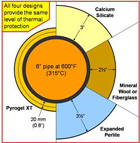
Aspen Aerogel’s insulation can be used for hot or cold applications to provide the same level of insulation as conventional products, but with up to five times less material. (Click on the image for an enlarged view.)
Aerogel insulation is produced in blanket form to allow for easy installation on piping. According to the DOE, Aerogel insulation has the lowest thermal conductivity of any known material and can be used in temperatures ranging from -460° to 1,200°F. This makes it suitable for cold or hot applications.
Aspen Aerogels offers the product in three versions:
• Cryogel Z for low-temperature applications, such as chilled water and cryogenic service;
• Pyrogel XT for high-temperature applications, such as steam distribution systems; and
• Pyrogel XTF, a special fire-protection grade.
Aerogel provides enhanced performance due to its flexible blanket form, which eases installation and lowers installation costs, and its long-term water resistance, which keeps moisture out of the insulation system and helps protect pipe from corrosion. Aerogel, on a weight basis, is more expensive to produce, but much less material is required, so the improved properties help offset the difference in cost.
According to DOE, Aerogel insulation has been successfully installed and used in plants around the world, including ExxonMobil, Suncor, Valero, Chevron, LyondellBasell, and Cheil (South Korea). If Aerogel insulation was applied to 40 percent of the 160,000 miles of U.S. industrial steam pipes, DOE estimates, this technology has potential annual energy savings of 16 trillion Btu and energy cost savings of $117 million.
Aerogel insulation is also being installed in building and construction applications, often as a simple renovation on masonry walls.
For more information on Aerogel insulation, download Aspen’s Industrial Insulation Brochure at www.aerogel.com/Aspen_Aerogels_Industrial_Insulation.pdf.
Publication date:07/20/2009

Report Abusive Comment